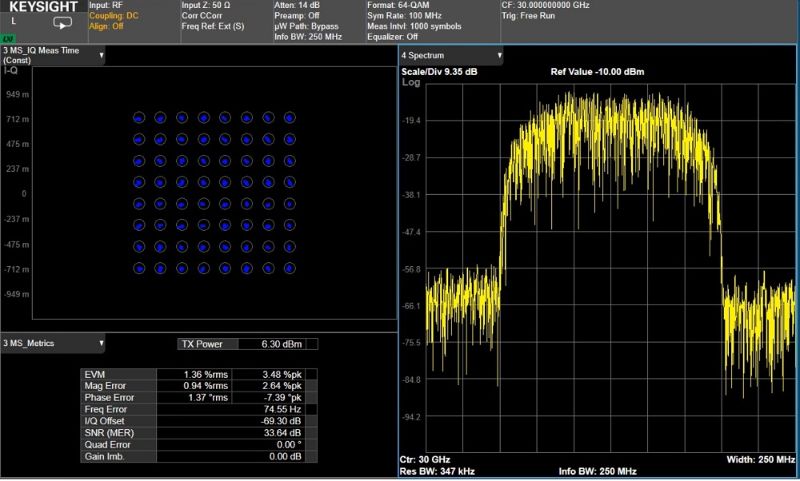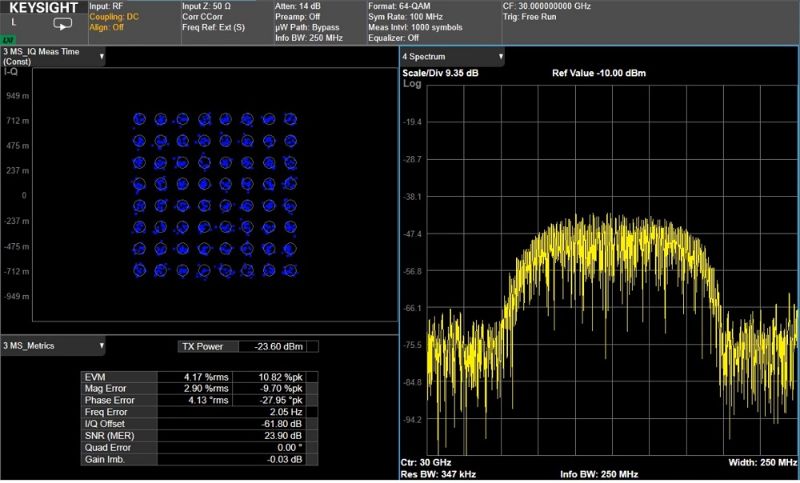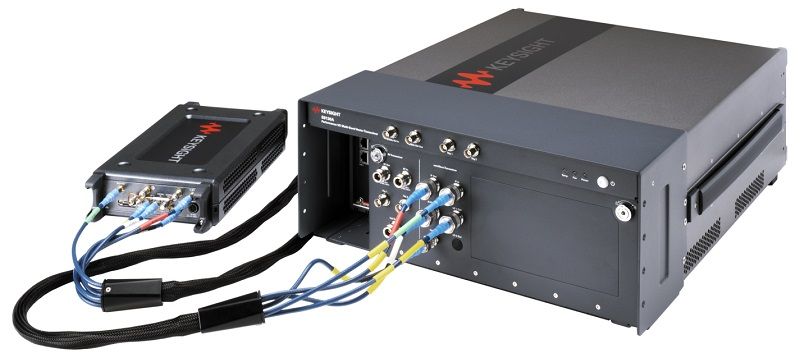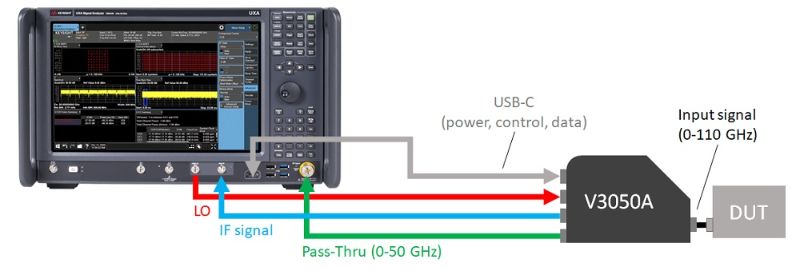Millimeter-wave technology is a key enabler for next-generation cellular and satellite communications. It provides ample margin for performance improvement, but it also creates many challenges. At millimeter-wave (mmWave) frequencies, excessive path loss makes RF power limited and costly. Any skew in a flange connection can cause unwanted reflections that degrade signal quality and power. Also, the components designed for mmWave devices are compact and highly integrated with no place to probe, resulting in the need for radiated tests, also known as over-the-air (OTA) tests. For typical radio applications, the free space path loss (FSPL) formula in terms of dB is expressed as:
FSPL (dB) = 20*log10(d) + 20*log10(f) - 147.55
d: distance between the antennas in units of km
f: carrier frequency in units of GHz
c: speed of light
The path loss increases dramatically when the frequency (f) increases. You need to control and calibrate the radiated environment around the test setup.
HOW DOES THIS IMPACT MEASUREMENTS?
The excessive path loss at millimeter-wave frequencies between instruments and devices under test (DUTs) results in a lower signal-to-noise ratio (SNR) for signal analysis. Lower SNR makes transmitter measurements challenging, such as error vector magnitude (EVM), adjacent channel power (ACP), and spurious emissions. Figures 1 and 2 compare the impact on EVM measurements with the same setups for high and low input signal levels. As the input signal level decreases, the EVM performance increases.

Figure 1. Better EVM performance for a high-SNR 64QAM signal

Figure 2. Poor EVM performance for a low-SNR 64QAM signal
Engineers typically reduce the attenuation of the signal analyzer to improve the SNR. However, even when the input attenuation is set to 0 dB, the SNR can still be too low for accurate signal analysis. So, minimizing any possible path loss is critical for millimeter-wave testing.
Minimizing any possible path loss is critical for millimeter-wave testing.
REDUCE SIGNAL PATH LOSS
Whether you're assessing transmitters, troubleshooting receivers, or analyzing OTA signals, the flexibility of signal analyzer hardware and software lets you create the optimum solution. A flexible solution helps you respond to different input signals: high-power to noise-like, low-frequency to terahertz, and a continuous wave to complex wideband modulation. To measure different input signals, signal analyzers can apply attenuation at higher power levels or a preamplifier at lower power levels.
Select right signal paths for your test applications
A signal analyzer offers several RF signal paths: default path, microwave preselector bypass, low-noise path, and full-bypass path. These lower noise, improve sensitivity and reduce signal path loss for a better SNR. Figure 3 shows the various signal paths of a signal analyzer.
1.Default path: The input travels through the RF attenuator, preamplifier, and preselector before reaching the mixer. It is most useful for measuring low-level signals with a bandwidth under 45 MHz, limited by the bandwidth of the preselector.
2.Microwave preselector bypass: Bypassing the preselector enables a wideband analysis and a flat spectrum response over the bandwidth of the digitizer.
3.Low-noise path: Bypass the lossy switches in the preamplifier path and the preamplifiers.
4. Full-bypass path: Combine the low-noise path and microwave preselector bypass.

Figure 3. A block diagram for various signal paths of a signal analyzer
The components in the default path, such as the attenuators, low-noise amplifier, pre-amplifier, and preselector, help you to optimize the signal levels for various test scenarios. For example, you can turn on or off the low-noise amplifier (LNA) and preamplifier that offers four choices of dynamic range and display averaged noise level (DANL)。 Download the application note, Full Bypass Path for X-Series Signal Analyzers, to learn how to get the best configuration of signal paths for your test.
Tip: Use the Optimize EVM function in the WLAN and 5G NR X-series measurement applications to quickly get the lowest residual EVM contribution from your X-Series Signal Analyzer. The Optimize EVM function automatically chooses the best hardware settings for mechanical attenuation, IF gain, preamp on/off state. It also optionally enables the Full-bypass path. It will save you from manually fine-tuning the hardware settings.
Use external mixing — extending frequency ranges and measurement plane
When you build a millimeter-wave test system, cables and accessories in the path between the signal analyzer and the DUT increase insertion loss. Adding an external mixer is a cost-effective way to extend the frequency range of a signal analyzer and move the test plane close to the DUT to reduce insertion loss caused by the long millimeter-wave signal routing.
Harmonic mixer
Signal analyzers send a microwave local oscillator (LO) signal to an external mixer and receive an intermediate frequency (IF) signal from the mixer through the same cable as shown in Figure 4. The analyzer further processes the IF signal with filtering, digitizing, analysis, and display operations similar to those for internal mixed signals.

Figure 4. The smart harmonic mixer's connectivity setups
For volume production tests, you can use a banded solution for in-band test cases. For example, an RF vector signal analyzer (VSA) and an RF vector signal generator (VSG) are essential for 5G frequency range 1 (FR1) in-band RF test cases. For FR2 in-band tests, the VSA and VSG, used as an IF signal analyzer and signal generator, can be coupled with an external millimeter-wave transceiver, as shown in Figure 5.

Figure 5. A banded and condensed solution for 5G FR1 and FR2 transmitter and receiver tests
External mixing provides a cost-effective solution for millimeter-wave signal analysis and moves the test port close to the DUT. However, there is no preselector at the front end of the mixer. Strong out-of-band signals may lead to unwanted images in the band of interest and degrade measurement accuracy.
Frequency extender
An advanced external frequency extender integrates a preselector and an RF switch into a high-dynamic-range mixer with the seamless operation interface of the signal analyzer. This solution enables unbanded and preselected swept power spectrum from 2 Hz to 110 GHz without managing band breaks and images, and the IF bandwidth up to 11 GHz. Figure 6 shows the test setups for a signal analyzer and an external frequency extender.

Figure 6. The N9042B X-series signal analyzer with the V3050A frequency extender delivers unbanded, preselected sweep from 2 Hz to 11 GHz and 11 GHz of analysis bandwidth
MORE THAN A SINGLE ANSWER
Millimeter-wave testing means not only higher frequencies but also wider input ranges. Engineers need to take extra care to evaluate millimeter-wave components and devices correctly. Understand your test applications and the test equipment that allows you to make accurate and repeatable measurements.
In my next blog, I will discuss testing wideband signals at millimeter-wave frequencies. Stay tuned.


